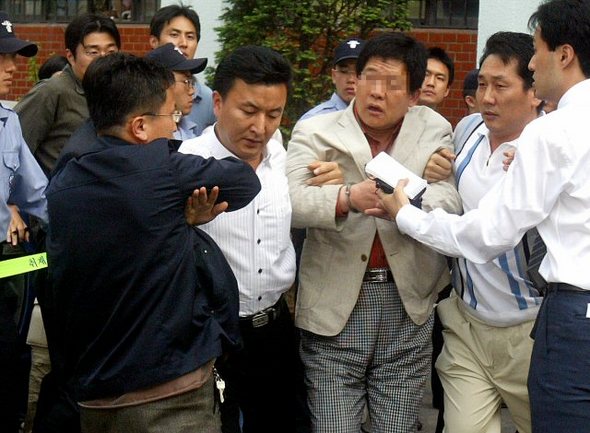Posted on : May.23,2006 10:20 KST
 |
|
Ji Choong-ho, the suspect in the assault of Park Geun-hye, was confronted by her supporters in front of the Seodaemoon Police Station when he was being taken to the Seoul Prosecution Office on May 21. (Yonhap News)
|
Friends say anger at justice system may have prompted attack
The profile of the 50-year-old attacker of opposition party chairwoman Park Geun-hye charts a history of physical and mental illness, as well as a distrust of police and the institution of law, according to his friends as well as investigators from the National Human Rights Commission of Korea.
In a May 22 telephone interview with the Hankyoreh, investigators of the National Human Rights Commission who interviewed Ji last month [LAST MONTH? YESTERDAY WE SAID THE OTHER GNP ATTACK WAS LAST DECEMBER--Ed.] in prison, where he was serving time for other charges, said that Mr. Ji had made an appeal for help with saving his eyesight, accusing doctors of attempting to take out his eyes, which were damaged by diabetes.
“After Ji was released, he attacked a GNP lawmaker [NAME--Ed.] to let people know his suffering on eyes at a department store in Shinchon,”--[HIS OTHER ATTACK WAS IN SINCHON, TOO?--Ed.] the commission said. “But, he was upset as the GNP dropped the charges.”
“Ji had been under growing pressure as his eyesight was fading,” the commission said. “Since Ji is seen as a patient with personality disorder, medical treatment should be considered along with his punishment.”
The Hankyoreh confirmed Ji had been treated for mental problems three times while in prison. At the time of treatment, doctors said Ji gave them fairly normal responses to their questions, but lost his temper when he was upset. The doctors did not diagnose him as having any particular mental illness.
A 51-year-old man, one of Ji’s childhood friends, claimed that Ji’s ill feelings toward the justice system was the fundamental issue behind prompting him to attack the GNP leader. “Ji said he was angry for having served five additional years in a correctional institution after serving his [official] 10-year prison term," the friend said.
Under the Social Protection Law, passed in 1980 by then-military-dictator Chun Doo-hwan, if a criminal is deemed a potential repeat offender, he serves a certain period in a correctional facility after serving the full term to which he has been sentenced. Under the law, criminals have served as many as seven additional years after completing their sentence. The Social Protection Law was abolished in August 2005 after complaints that it was a human rights violation. Still, about 360 people are still detained at correctional facilities under the old law.
According to Ji’s friend, he had strongly criticized the GNP’s predecessor, the Democracy and Justice Party of former dictator Chun Doo-hwan, the architect of the Social Protection Law.
“Ji frequently sent letters to me, saying he felt wrath, and that he would seek compensation from the government after his release,” the friend said. “While the media call the attack [on Park Geun-hye] ’political terror’ or attempted murder, Ji may have just been trying to express his rage at the justice system," the friend said.
Ji also holds a distrust of investigational authorities. “During a police investigation, Ji declined to answer the most important questons,” said a senior official of the Seoul Metropolitan Police Agency. “Ji said he doesn’t trust the police because he was beaten many times while being interrogated in the past.”
Regarding Ji’s mental status, Lee Woong-hyuk, a professor at the Korea National Police University, said research on U.S. political assassins showed their intention often was to solve their personal problems through receiving attention from society.
“Though Ji is seen as delusional, a thorough inspection is needed."






